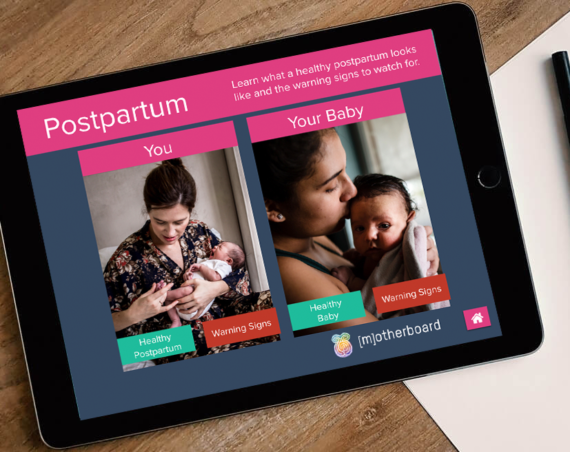Unimpressed by the Brexit turmoil, Jelena Jansson just recently moved her company to London. And she hasn’t looked back. After starting Healstack in Sweden, the entrepreneur decided, that the startup culture in one of Europe’s premiere startup hubs was a better fit for her and her company.
We spoke to her about her decision, Healstack’s mission to advocate for body positivity and make treatment for eating disorders more accessible as well as her entrepreneurial journey so far.

Can you tell us a little more about Healstack? What can women expect from your app? What’s unique about it?
JJ: Healstack, is a body-positive health app that helps women overcome disordered eating by making restrictive dieting a thing of past.
If you look at dieting and health apps in general, you will find that when you suffer from disorder eating you just can’t diet or use typical apps currently on the market, because calorie or macro counting really puts you in for a spin. Let’s say you’re overweight but despite your mental health you still feel you want to lose weight. You’re going against yourself in a way because your mental health will deteriorate if you impose a restriction that robs you from meaningful experiences with friends, from things you love to do etc.
Many women (and men) get “stuck” in their recovery because they are not ready to just ditch losing weight, but they still want to improve their relationship with food & self. Our tech will enable them to get out of that limbo so they can improve their food relationship but also reach their physical goals without creating stressors.
Beyond tech, Healstack is an empowerment platform that enables everyone to find and grow their self-esteem and self love, usually stemming from childhood adverse experiences and other traumatic events. It is not just for those who suspect they have some form of disordered eating, it is a safer tool for everyone who wants to improve their daily routines, relationship with food and self, by involving themselves in a meaningful community & through exploring and listening to our lesson plan. Healstack is a health app, a body-positive community & knowledge platform, and mental health support — all in one.
What motivated you to start working on the app and what problem are you trying to solve?
JJ: My motivation was very personal. I suffered from Binge Eating Disorder since I was a child and had a really hard time finding help. BED only got officially recognised in 2013, so you can imagine that access to help is limited. CBT is the most successful form of therapy available, but due to mental stigma and cost, it is not a viable option for the majority of the world. This is why many people with disordered eating only make their problem worse by using calorie counters, trackers and other tools that are made with data so intensive that would fit more athletes than someone who has a core sensitivity to this, rooted in anxiety and depression. Diet industry prays on individuals like myself, which leads to more issues down the line.
So we want to solve the problem of the accessibility to help, the rigidity of dieting & impact of stigma on people who find themselves losing control over their body due to immense pressure to fit in. With social media, it’s becoming even harder for people to just allow themselves time to exist in a “non-perfect” state, and sometimes that is necessary to reach a point of balance.
We focus so much on obesity as a problem, but the true issue is the lack of mental health focus. My eating disorder was at its worst when I was most fit, nobody really cared to notice the issue. Yet, I faced the most external stigma and bullying for my body when I was in recovery because I gained weight. It is this paradox that nobody really recognises, as the society is completely ok with bullying fat individuals. We still have a long way to recognise the importance of mental health support, at whatever size.
And yes, I like to use the word “fat” openly as a descriptor versus an insult as it needs to be reclaimed from the negative space to a descriptive space.
How long have you been working on healstack and your plans? When will the app be available in the app store? Are you currently raising money? Are you hiring?
JJ: Healstack as a concept has existed for 3 years, but we officially started building at the beginning of 2019. We hope to release end of this year.
We are not raising money at the moment as we realised we want to build a value-based self-sustainable business outside of VC machine for the time being to make sure we don’t stray from our core pillar of never putting our user in the harm’s way for profits.
Since we are self-funded, we are not hiring at the moment, but we hope to do so next year.
You recently moved your company to London despite Brexit. Can you tell us a little more about that? Why did you decide to make this move?
JJ: London is great because it is very open and diverse. There are so many people, topics, streams that are currently happening it is hard to not find something that suits you or elevates your own journey. It is vibrant, dynamic and offers many entry points, similar to New York, but less harsh.
This is a great space to grow, especially for me as an immigrant and someone coming from an underprivileged background.
We decided to move because Sweden wasn’t our core market and we didn’t align fully with the system there. We felt there was a glass ceiling that we wanted to leave behind and “up” our opportunities to grow this business in a more open & inclusive way. Building Healstack the right way is very important for me, and we are unable to do that from “afar”.
How does the startup scene in the Nordics compare to London, which is known as one of the biggest startup hubs in Europe?
JJ: Nordics have an established tech ecosystem that is mostly nested in Stockholm. You also have Malmo, Helsinki and Copenhagen as additional hubs, but core action is in Stockholm. Spotify, Klarna, Lifesum are well known, but there is emergence of plenty of newcomers like Karma, Grace Health and Kry. There is room for innovation and exploration, especially tackling the human experience through tech.
My experience with Stockholm is polarising in a way that there are many opportunities and inspirational tech stories, but I feel that they are mostly reserved for Swedes and people deeply nested in these closed circles. I am married to a Swedish national and have lived in Sweden for years, but I found it to be an extremely hard environment for a foreigner because the culture is very reserved and sensitive to branding and clout.
In addition, there is discrimination that really blindsides you. I am from Balkans and have experienced systematic level of classism in their system, something I truly wasn’t expecting as their branding is very open, inviting and nested on this “Stockholm the open city” trope. I lived in 10 countries prior, from places like New York, to Gibraltar, so I never expected to struggle so much in the Nordics. One example is that I wouldn’t get any response until I changed my Croatian last name to my now husbands, which is Swedish. It truly blew my mind. I felt very unwelcomed before even meeting anyone, something that now I can compare to London which is a complete opposite of Stockholm.
In London, you are so welcomed that it overwhelms you. The core desire to connect exists, which is crucial for making friends, finding work and building meaningful businesses.
I still believe Sweden offers opportunities and is a comfortable place to live once you break the barrier but to break that barrier you must invest time, money and effort. I simply didn’t see the outcomes worth the investment since the market is capped. It’s not to sound negative, I am truly being honest about my experience because I feel people need to hear different sides to a story and make up their own opinion about something. This is just my story, so take it for what it is.
That said, I think the city of Malmo needs more praise and glory in this Nordic tech hubs storyline. It is this diamond in the rough most see as a lump of coal. As a city, it is this sidetracked underdog that holds immense potential and that has given us a lot of support in our Healstack beginning. We are very thankful to the team at Minc Startup Incubator and we hope they get the deserved recognition. Malmo is sidetracked in Sweden opposed to Stockholm, due to views on immigration and diversity, but it is a great and vibrant “warm-hearted” hub with personality, that everyone should check out, especially due to its closeness to Copenhagen, another vibrant tech hub.



